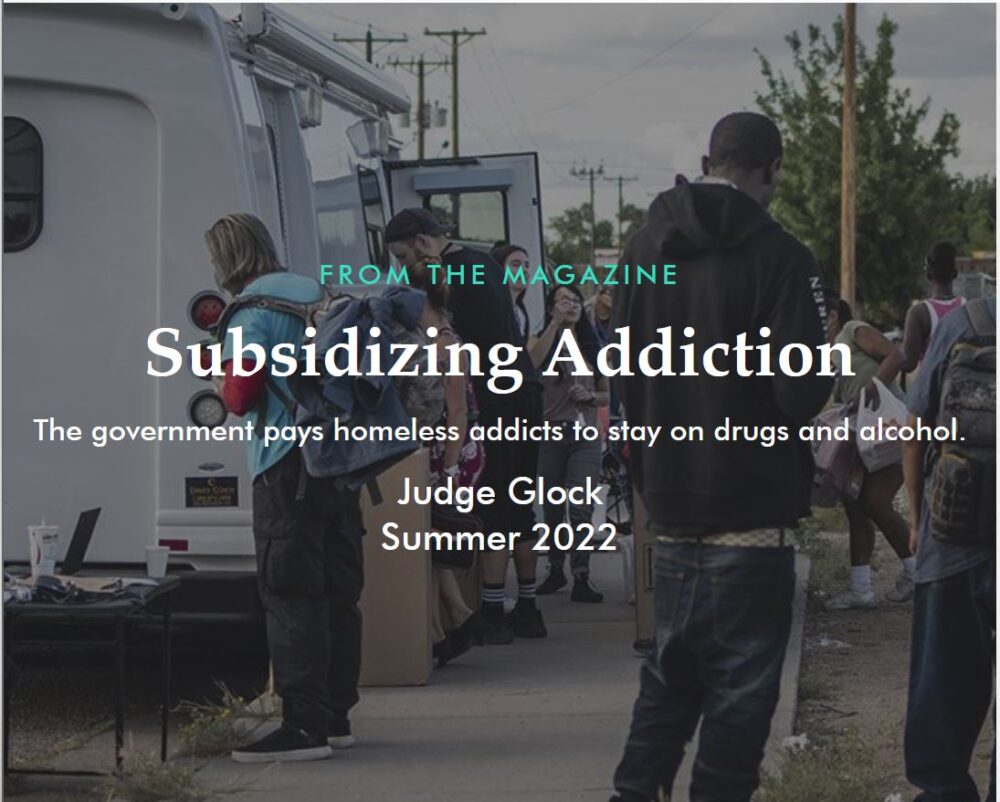On a fundamental level, changing problematic behavior is a personal struggle. While others can help, the involved individual either makes the needed change or not. Simple logic and critical thinking tell us, if we seek another to do less of something, we should discourage such behavior. So to we know, a key method by which to encourage a behavior is to incentivize it. When a financial benefit is linked to a behavior, we tend to see more of it. However, such is true even if that behavior is damaging. In the Summer 2022 issue of City Journal, public policy analyst Judge Glock provides a devastating look at how government policies have incentivized drug addiction and criminality. Taxpayer funds purportedly seeking to address homelessness are instead fostering misery and death. The article and an interview this past week with the author are recommended resources.
Estimated reading time: 5 minutes
How to Incentivize Misery
Many mothers over the years have cautioned their children about the dangers of associating with others who are bad role models. Researchers formalized this motherly concern with discussions about the influences of delinquent peer groups. When government incentivizes problematic behaviors, the negative impact can be even more disastrous, impacting entire communities. Such is the case with the government housing programs highlighted by Glock.
Not only have these programs failed to lessen homelessness, the problem has grown in scale and complexity. Quoting from the article:

“If anyone wonders why, say, Los Angeles suffers around 2,000 homeless deaths a year—quadruple the level of about a decade ago—and if anyone wonders why drug abuse and violence are the overwhelming killers of the homeless, one reason is that the government is paying them to kill themselves and one another.”
Glock’s analysis provides stark clarity. He explained: “Today, drug abuse is not a barrier for homeless people seeking housing and welfare. In fact, many policies make drug abuse a prerequisite for services. Federal, state, and local programs give addicts more funds and assistance than nonaddicts. And other favors go to homeless individuals who can prove that they’re engaging in criminal activity.”
Interview with Judge Glock
Glock was a guest Thursday morning on the AM560 radio program “Chicago’s Morning Answer.” In the below interview, hosts Dan Proft and Amy Jacobson discuss Glock’s key findings. The current government policies are failing those with addictions and mental illness. Those same policies are also making communities less livable and more dangerous.
In considering how such policy failures can linger and metastasize, another key point bears noting. Huge government programs are costly to taxpayers. Yet, these same programs can be enriching to bureaucrats and the funded vendors.
Questioning Failed Approaches
Here are two “cops ask questions” questions. First, which is more profitable? Eliminating a problem, or managing a problem for decades? Second, when public policies lessen public safety, what should the community demand? The answer to the first is a word of caution. Not all motivations in addressing huge social issues are pure. In fact, perpetuating a problem can be lucrative – at least for some. The answer to the second question should be clear. Relative to addressing issues like homelessness, government should never reward or incentivize drug dealing, addition, crime, and violence. Period.
As noted by President Ronald Reagan, too often government programs and policies fail to advance the public’s interests. In President Reagan’s first inaugural address he famously observed:

“In this present crisis, government is not the solution to our problem; government is the problem. From time to time we’ve been tempted to believe that society has become too complex to be managed by self-rule, that government by an elite group is superior to government for, by, and of the people. But if no one among us is capable of governing himself, then who among us has the capacity to govern someone else?”
As noted by Glock, taxpayers have previously rejected enabling social policies of failure. Changes were made in federal law that ended several increasingly damaging programs of the the 1970s and 1980s. However, as progressive politics once again took root within government, those changes have been circumvented and reversed. Achievement and accountability measures were replaced with models absent approaches capable of building independence and individual responsibility. In life, bad choices ultimately have consequences. The worse choices can lead to deeply troubling outcomes. How the consequences play out can shift dramatically for those involved in the problematic behaviors, their families, and their communities. But, there remain consequences.
Incentivizing Gratitude
As noted by Dan Proft, the philosopher Cicero (106-43 BC) instructed that “gratitude is not only the greatest of virtues, but the parent of all others.” Governmental programs that encourage behaviors that create misery are beyond misguided. No program should ever discourage treatment and punish recovery. No wonder so many that receive “benefits” under such failed approaches are ungrateful, bitter and even dangerous. Public policy addiction program approaches must incentivize true recovery and attachment to the community. Then, not only will program participants have reason to be grateful, the community itself will reap a benefit of enhanced public safety. Facilitating lives of misery is neither compassionate nor the way forward.
We are interested in your thoughts, and invite you to comment below.


